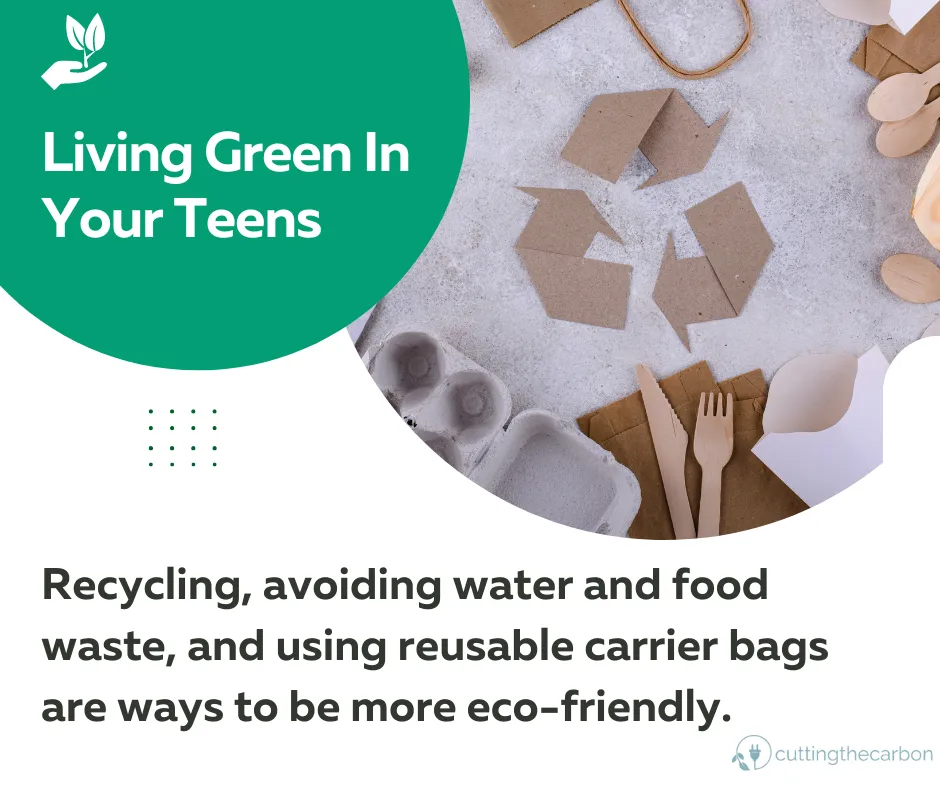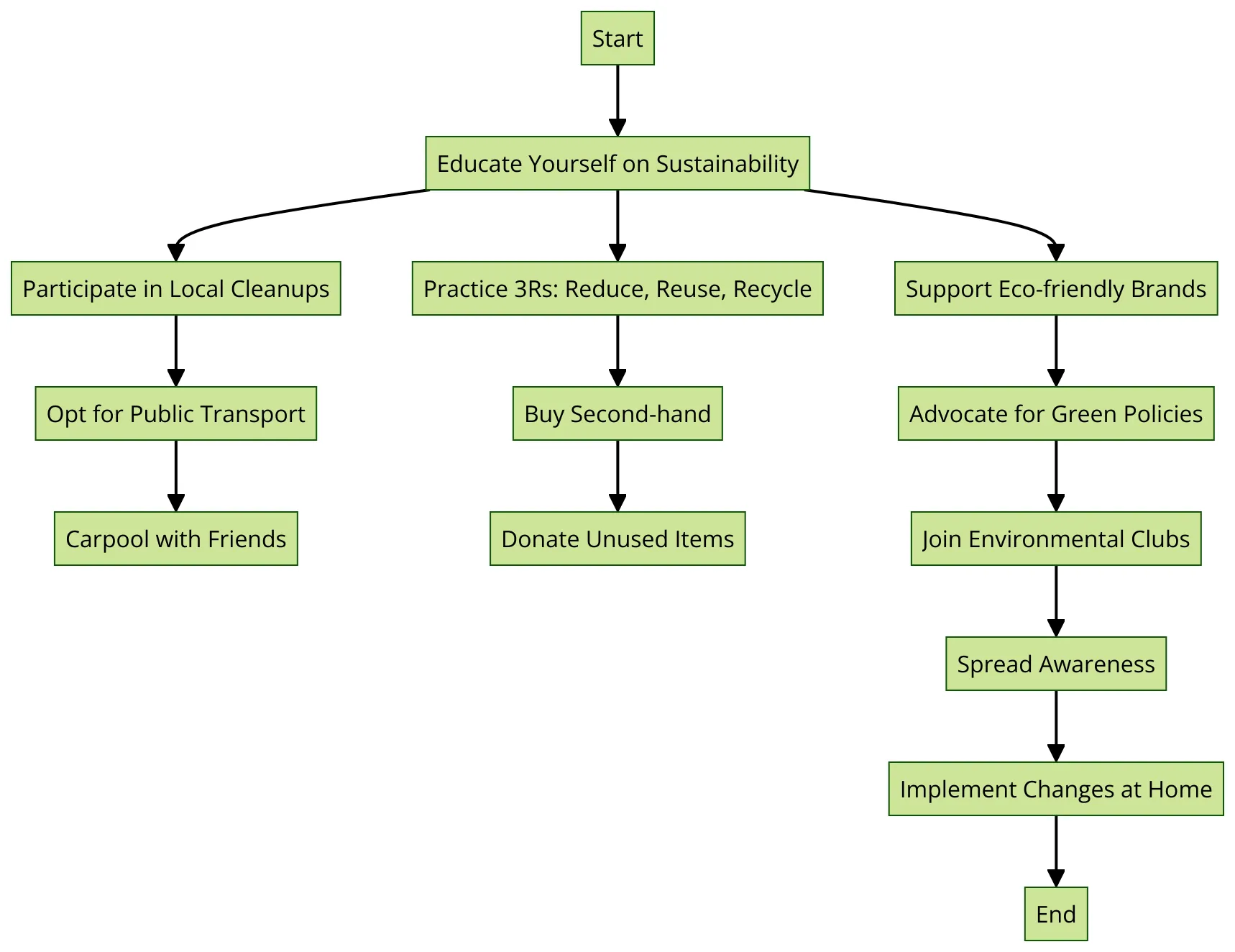Being eco-friendly as a teenager can often seem daunting. With the continuous bombardment of global warming and ecological harm reports, it can be daunting to feel powerless. But here’s the truth…
You have more power than you think. Becoming an eco-friendly teen isn’t just about big gestures; it’s also about making small changes in your daily life that add up over time.
Learning how to be eco-friendly as a teenager could very well set you on a path towards lifelong sustainable habits.

Sustainable Tech Products for Teenagers
| Product Type | Description | Benefits |
|---|---|---|
| Compostable Phone Cases | Cases that decompose naturally, reducing landfill waste. | Minimises environmental impact of tech. |
| E-books and Audiobooks | Digital formats that reduce the need for physical copies, saving trees and water. | Cut down on paper and water usage. |
| Energy-Efficient Gadgets | Devices designed to use less energy during operation. | Reduces electricity consumption and costs. |
Eco-Friendly Transportation Choices
| Transportation Method | Description | Environmental Benefit |
|---|---|---|
| Biking | Using bicycles for short to moderate distances. | Reduces carbon emissions and promotes physical health. |
| Public Transportation | Utilising buses, trains, and trams available in the area. | Lowers individual carbon footprints by sharing rides. |
| Electric Vehicles | Cars that run on electric power instead of gasoline. | Eliminates tailpipe emissions completely. |
Tips for Reducing Food Waste
| Strategy | Description | Impact on Sustainability |
|---|---|---|
| Meal Planning | Organising meals ahead to reduce excess buying and waste. | Decreases food spoilage and unnecessary purchases. |
| Proper Food Storage | Using appropriate containers and refrigeration settings. | Extends the life of perishable goods, reducing waste. |
| Composting | Turning food scraps into nutrient-rich compost. | Reduces landfill use and recycles organic materials. |
Engaging in Community Environmental Actions
| Activity Type | Description | Community Benefit |
|---|---|---|
| Beach Clean-ups | Organising groups to clean local water bodies. | Keeps local waters free of debris and pollution. |
| Gardening Projects | Participating in or starting local gardening efforts. | Promotes local flora and provides fresh produce. |
| Educational Workshops | Hosting or attending sessions on sustainability. | Raises awareness and educates the community on environmental issues. |
Understanding the Environmental Impact of Our Actions
The environmental impact we generate reflects our actions and behaviours. It’s an umbrella term covering everything from air pollution due to vehicle emissions to deforestation for farming needs to waste generation through everyday activities.
To put this into perspective, let’s consider straw usage. According to certain eco experts, Americans use 500 million straws daily—that equates to the weight of 1,000 cars. This astounding statistic underscores how seemingly minor habits can substantially contribute to common global environmental issues.
In Britain specifically, certain critical areas require immediate action.
These include decreasing carbon discharges (mainly from transport and energy production), improving air quality (especially in urban regions), dealing with rubbish more productively, and safeguarding biodiversity, all while taking on climate change—arguably one of humanity’s most overwhelming difficulties.
Implementing Environmental Protection Actions
Tackling these problems requires implementing environmental protection actions at both individual and societal levels.
The objective here isn’t merely about “going green” but adopting sustainable practices to ensure long-term ecological balance without compromising future generations’ ability to meet their needs.
This could involve anything from diligent recycling to choosing public transportation over personal vehicles whenever feasible, all of which aim to reduce our collective carbon footprint.
While such steps might initially appear small, when adopted en masse, they can significantly reduce greenhouse gas emissions, helping tackle climate change efficiently.
Sustainable Lifestyle Choices: An Average Teen Perspective
There is no need for political power or adulthood status either; teenagers, too, play a pivotal role in shaping our planet’s future and implementing environmental protection actions.
For an average teen living amidst these realities, it becomes crucial not only to understand what sustainability means but also to find ways to incorporate eco-friendly practices into their lifestyle—whether it involves using reusable water bottles instead of single-use plastic ones or encouraging friends to make behaviour changes that support sustainability goals.
Being eco-friendly isn’t just about ‘going green’, it’s a lifestyle choice. From understanding the impact of our actions, like using straws or driving cars, to making small changes in everyday habits such as recycling and choosing public transport – every bit counts. And remember, you don’t need to be an adult to make a difference; teenagers can play a crucial role.
Making Eco-Friendly Choices in Daily Life
Our everyday decisions have the power to shape our environmental impact. By consciously choosing eco-friendly alternatives, we can significantly reduce emissions and take a step towards leading sustainable lifestyles.
The first place to start is with sustainably designed products. These items have been created with an eye on minimizing harm to our planet, from responsibly sourced materials to manufacturing processes that limit waste and pollution.
The Power of Recycling
Recycling is a key player in any journey towards sustainability. But it’s not just about disposing of rubbish correctly; it also involves buying goods made from recycled materials whenever possible.
This circular approach ensures fewer raw materials are needed for new products, conserving natural resources while reducing energy consumption and greenhouse gas emissions associated with extraction and processing.
Comprehensive guides detailing what you can recycle in the UK and tips on buying recycled goods can be found online.
Energy Conservation Practices
Beyond product choices lie opportunities within your home where simple actions could lead to substantial changes when done consistently over time, such as turning off lights when they’re no longer required or unplugging chargers once their job is complete—all steps that help lower carbon footprints.
An often overlooked practice involves avoiding leaving appliances on standby mode. Even though these devices aren’t actively used, they still consume electricity, colloquially known as ‘phantom power’. According to the Energy Saving Trust, households could save up to £80 annually by switching off unused devices.
This goes beyond saving money; it’s about taking responsibility for one’s head-on contribution to climate change.
Being eco-friendly as a teenager in the UK involves making conscious daily choices, from buying sustainably designed products to recycling and conserving energy at home. Remember, every little action counts towards reducing our carbon footprint and tackling climate change head-on.
The Role of Food in Sustainability
Food is a key factor in determining our environmental impact. The UK alone wastes an alarming 9.5 million tonnes of food per year, which has dire consequences for climate change and represents an inefficient use of resources.
However, there is hope. We can take steps to implement environmental protection actions and adopt strategies explicitly designed to tackle this issue head-on.
Reducing Food Waste
An integral part of reducing our carbon footprint lies in curbing food waste. This begins with something as simple as planning meals. This practice ensures that we purchase only what is needed and avoid buying excess perishable items that may be unused or discarded.
Beyond meal planning, another equally important aspect is proper storage techniques. Knowing how different foods should be stored, for instance, whether they need refrigeration or room temperature conditions, is key in preventing them from spoiling prematurely.
In addition to these measures, composting leftovers rather than throwing them away serves dual purposes: it recycles nutrients back into the soil while simultaneously decreasing methane emissions (a potent greenhouse gas) produced by landfills during decomposition processes.

The Benefits of a Plant-Based Diet
A shift towards plant-based diets is another powerful tool for significantly reducing our carbon footprint. This is especially pertinent considering that agriculture accounts for about 25% of global greenhouse gas emissions.
Livestock farming is particularly culpable because its production process requires vast amounts of water and land compared to crops grown directly for human consumption.
Shifting focus onto local produce also helps decrease transportation-related emissions associated with importing goods from abroad. It is about ‘what’ you eat and where your food originates.
Sustainability doesn’t stop here: Your small step today could lead us all towards more sustainable eating habits tomorrow.
Being eco-friendly isn’t just about recycling; it’s also what we eat and how we handle food. By planning meals, storing food properly, composting leftovers and embracing a plant-based diet with locally sourced produce, UK teenagers can make significant strides towards reducing their carbon footprint.
Engaging with Others for Environmental Change
Traversing the course to a sustainable way of living doesn’t have to be an individual endeavour. It’s often more rewarding and effective when shared. We can all play our part in tackling climate change by engaging others in conversations about environmental sustainability and encouraging friends to make behaviour changes that support environmentally sustainable practices.
Conversations About Sustainability
Chicago Parent’s Instagram account offers an excellent example of how social media platforms can be utilised as powerful tools for initiating discussions on conservation among the youth demographic.
The platform provides content tailored to engage younger audiences, simplifying complex topics around common environmental issues into digestible information that inspires action.
In addition, face-to-face interactions are vital avenues through which these important dialogues should occur. Whether within your circle of friends or family members, every discussion contributes to fostering understanding and promoting sustainable lifestyles.
Taking Part in Community Initiatives
Beyond individual efforts lies another opportunity – community initiatives. These collective endeavours offer significant potential for impact while raising awareness among peers about the importance of reducing waste where possible.
- Beach clean-ups serve dual purposes – they keep our oceans free from harmful debris whilst providing tangible evidence of daily litter production levels;
- Gardening projects promote biodiversity while offering fresh produce without any associated carbon footprint due to transportation costs.
Community initiatives is a great source of information for those seeking local opportunities.
Waste Reduction Calculator
The Significance of Sustainable Choices in School and Work
When it comes to shrinking our environmental impact, our decisions in educational and occupational settings can have a major bearing. Let’s delve into how you can lead sustainable lifestyles within these environments.
Sustainable Practices in Schools
Schools provide ample opportunities for implementing environmental protection actions in the life of an average teen. The first step? Going digital. Instead of relying on paper-based materials for assignments and notes, consider leveraging digital platforms as much as possible.
Beyond this initial move towards sustainability lies another impactful strategy: initiating recycling programs. Recycling Facts UK is a fantastic resource that clarifies how segregating waste into recyclable and non-recyclable items significantly reduces landfill waste – worth checking out.
Eco-friendly Initiatives at Workplaces
Moving onto workplaces where employees have considerable sway over environmentally sustainable practices, one effective approach involves advocating energy-efficient appliances or lighting systems, which could reduce emissions over time.
But why stop there? Promoting ‘green’ commuting options among colleagues, like carpooling or cycling, not only cuts down fuel consumption but also boosts physical fitness.
Fostering Sustainability Through Education and Advocacy
Students and professionals must understand why these measures matter in order to bring lasting changes.
Therefore, it would be beneficial to integrate lessons about climate change into curriculums, host workshops on sustainability, or invite guest speakers specialising in environmental issues. NASA’s Climate Kids website offers engaging resources to educate youngsters about climate change.
Don’t put off taking action to preserve our environment – start making sustainable decisions today.
Teenagers can make a real difference to the planet by embracing eco-friendly habits at school and work. Go digital, recycle more, advocate for energy-efficient appliances and promote green commuting options. Remember, education is key – learn about climate change and spread the word.
Sustainable Birthdays and Celebrations
As the UK confronts shared ecological troubles, there is a rising need for everyone – including adolescents – to begin taking steps to safeguard the environment. One area where this can be done is during birthdays and other celebrations.
The Gift of Sustainability
Incorporating sustainability into gift-giving practices can make a significant difference. Instead of using traditional presents wrapped in non-sustainable packaging materials, why not choose gifts that promote environmentally sustainable methods or support fair trade?
This doesn’t mean giving up on fun or thoughtful gifts – far from it. Consider experiences over physical items; perhaps tickets to an online concert or membership at a local museum? These are just as exciting and meaningful without contributing unnecessarily to reduced emissions.
Eco-Friendly Decorations and Food Choices
When planning your celebration decor, consider reducing waste by favouring sustainably designed products instead of single-use decorations. For instance, fabric bunting makes great reusable banners, while LED fairy lights provide energy-efficient illumination compared to conventional light bulbs.
- Avoid wasting food by carefully planning your meals according to the number of guests attending.
- Favour locally sourced ingredients, which help reduce the carbon footprint caused by long-distance transportation.
- Promote plant-based options whenever possible, thus further lowering one’s contribution towards climate change through diet choices. BBC GoodFood suggests numerous vegan-friendly recipes perfect for parties.
How To Be More Eco-Friendly As A Young Person Flowchart

The Importance of Outdoor Activities for Environmental Awareness
Outdoor activities are a source of enjoyment for teenagers and an effective tool in fostering environmental awareness. Nature serves as an invaluable instructor in comprehending the condition of our world and its interdependence.
Taking part in outdoor pursuits helps teenagers realise their responsibility to preserve nature. They get firsthand experience of various environmental issues, such as climate change, deforestation, and pollution, which are common topics discussed within the UK’s eco-conscious circles.
Exploring Local Parks
Exploring local parks can open up a world full of biodiversity right at one’s doorstep. It allows teens to appreciate their immediate environment while comprehending why it needs protection.
Parks host diverse species, making them ideal bird-watching or insect-spotting spots. Observing these creatures thrive naturally reinforces how each organism plays an integral role within ecosystems.
The National Trust, a renowned conservation organisation, offers guided walks, further enhancing this learning process.
Hiking and Camping Trips
Research suggests that hiking and camping trips provide immersive experiences in untouched landscapes where youngsters learn about varied flora and fauna.
These expeditions promote sustainable practices like leaving no trace behind, minimising the impact by taking all waste home or disposing of it correctly at designated areas, and thus encouraging responsible behaviour towards our surroundings.
Nature-Based Projects and Citizen Science Initiatives
Citizen science initiatives offer hands-on opportunities for youth involvement in protecting biodiversity through monitoring wildlife populations, tree planting exercises, or litter clean-ups.
School-based projects centred around nature conservation educate while actively involving students in implementing environmental protection actions to tackle climate change. WWF, a leading international charity, promotes such programs extensively across Britain.
Outdoor activities, from exploring local parks to hiking and camping trips, are more than just fun for teenagers – they’re an education in environmental awareness. These experiences expose teens to the reality of issues like climate change and pollution while teaching them about biodiversity and sustainable practices. Additionally, nature-based projects and citizen science initiatives offer practical ways for young people to get involved in conservation efforts.
What Are Some Eco-Friendly Fashion Choices For Teenagers?
Clothing Brands:
- Parks Project offers a variety of eco-friendly and sustainable clothing options for teens, including fleece pullovers, hoodies, and T-shirts made from recycled and organic materials. The brand also donates a portion of proceeds to national park conservation efforts.
- Levi’s – A well-known denim brand that produces sustainable jeans and other apparel using recycled and organic materials.
- Thought – A UK-based brand that uses sustainable fabrics to create affordable, stylish, and eco-friendly clothing for teenagers.
Sustainable Shopping Habits:
- Buy secondhand or vintage clothing from resale platforms like ASOS Marketplace. This reduces waste and supports the circular economy.
- When shopping, look for clothing made from recycled, organic, or other eco-friendly materials. Check labels to ensure products are sustainable.
- Be willing to spend a bit more (up to 30% more on average) for eco-friendly versions of clothing.
Other Tips:
- Choose versatile, durable clothing that can be worn for longer periods.
- Recycle, reuse, and repurpose clothing when possible to reduce waste.
- Encourage friends also to make sustainable fashion choices.
The key is to look for clothing that balances style, affordability, and environmental sustainability. Making small changes in shopping habits can have a big impact.
FAQs about How to Be Eco-Friendly as a Teenager
How can 14-year-olds improve the environment?
Fourteen-year-olds can help by recycling, reducing energy use at home, adopting a plant-based diet, and engaging in local community clean-up initiatives.
How can I be 100% eco-friendly?
Becoming completely eco-friendly involves making sustainable choices daily. This includes consuming less, reusing more, choosing renewable energy sources, and advocating for environmental policies.
How can a beginner be eco-friendly?
A beginner could start with small steps, such as turning off lights when unnecessary, recycling waste, or using reusable shopping bags instead of plastic ones.
What age group is the most eco-friendly?
According to Statista, the younger generation (16-24 years old) tends to have higher levels of environmental concern.
Some Final Thoughts
Being eco-friendly as a teenager isn’t just about saving the planet. It’s about embracing a lifestyle that respects and cherishes our natural resources.
You’ve learned how daily choices can make an enormous difference, from recycling to energy conservation practices at home.
We explored food’s sustainability role with tips on reducing waste and adopting plant-based diets for lower carbon footprints.
The power of engaging others through conversations about sustainability or participating in community initiatives has been highlighted, too.
Schools, workplaces, and even birthday parties offer opportunities to make sustainable choices. Outdoor activities foster a love for nature, which is vital for a long-term commitment to environmental protection.
If you’re ready to take your eco-conscious journey further, consider exploring green technology solutions like solar panels or electric vehicle charging stations with Cuttingthecarbon.
These help reduce your carbon footprint and save money on energy bills, embodying the spirit of being environmentally friendly while benefiting yourself personally.
Citations:
[1] https://www.sheknows.com/parenting/articles/2880424/eco-friendly-clothes-teens-parks-project/
[2] https://www.thesun.co.uk/news/18337802/teens-eco-friendly-lifestyles/
[4] https://www.panaprium.com/blogs/i/teenage-clothing-uk
[5] https://www.mirror.co.uk/lifestyle/teens-tackling-climate-change-sustainability-26771277

